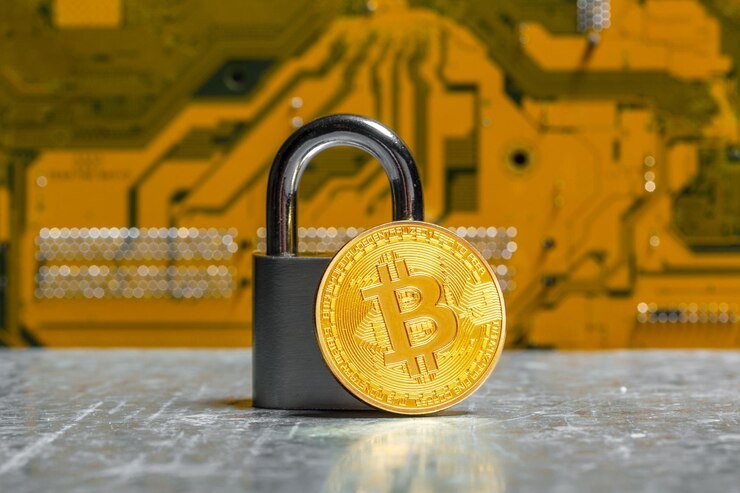Introduction: Understanding the Importance of Bitcoin Security
Being the first and most widely used cryptocurrency, Bitcoin showed a new direction for digital money. These intermediaries can be banks or governments and are not needed with the decentralized character. Yet with this kind of independence also comes the onus of securing your Bitcoins. The same goes with bitcoin and as the value grows, so does it make a more tempting target for hackers/scum/criminals. For that reason, keeping your Bitcoin me is not an alternative but a part and parcel of anyone who matters in the world of cryptocurrencies.
We will break down methods to secure the Bitcoin you have, from basic steps everyone should do to advanced strategies for power users. Whether you are a newbie or an experienced investor, making these practices part of your life will not only protect your investment but also keep you peace of mind.
1. Understanding How Bitcoin Security Works
To secure your Bitcoin properly need to know how these cryptocurrencies work if you are going to secure them well. The private key can only be unlocked with the public wallet, which is as closely identified to you (or more so). The public key is the bank account number (like where others would send Bitcoin) On the other hand, a private key is more or less like something you keep secret only with this can anyone control and use Bitcoin in your wallet.
Your Bitcoin is safe as long as you secure your private key properly. If someone gets to know your private key, he can basically control your Bitcoin. This is why safeguarding your private key is the most important thing you can do to protect your Bitcoins.
2. The Importance of Choosing the Right Wallet
One of the first choices you will make when starting with Bitcoin is selecting the suitable wallet to save your cryptocurrency. Many wallets may be used, each of which comes with support for different security features:
• Hot Wallets: These are online and provide a faster way of transacting every day. But because they exist online, they are more susceptible to hacking and cyberattacks.
• Cold Wallets: Offline storageIn comparison, these might be safer options for long-term holdings. Hardware wallets (in the form of physical devices that store your private keys offline.)Paper wallets (as in, a physical copy of said public and private key).
A combination of hot and cold wallets is best for maximum security Use a hot wallet for everyday transactions with small amounts, and keep the larger amount that you want to hold long term in your cold storage /igiouscasino online.
3. The Power of Hardware Wallets
Hardware Wallet A hardware wallet is considered one of the most secure ways to store your Bitcoin. Devices like Ledger Nano S or Trezor store your private keys offline, which means they cannot be attacked online. Malware on your computer does not matter since the private keys touch never the internet.
It is equally important to buy the hardware wallet from a trusted source. If you buy from unofficial channels or second-hand, the devices may have been meddled with so that whoever tampered with them can still peep into your activities.
4. The Role of Strong Passwords and Two-Factor Authentication (2FA)
It might sound a bit basic, but if you store your Bitcoin via an online service or exchange then setting up a strong password (and making it unique) is super-important. Use both capital and small letters, numbers, and special characters in your password. Do not use information that can be easily guessed as a birthday or common words.
Always use a strong password and enable two-factor authentication (2FA) on all your accounts. 2FA is an added layer of security that requires you to provide a second means of verification after your username and password before signing in (e.g., by receiving a text message or using an authenticator app). It makes it quite difficult for hackers to get on your account even if they have found the password.
5. Backup Your Wallet Regularly
Your Bitcoin Wallet Must Be Backed Up It is your backup in case you lose access to your wallet because of a computer crash, lost device, or other unforeseen events.
It is also recommended to back up your wallet and make sure the backup is stored securely. Backup backups should be made to multiple secure places, such as encrypted USB drives or external hard drives. You might opt to keep your backup offline in order to reduce the risk of online theft.
6. Avoid Phishing Scams and Fake Websites
Nowadays BTC scammers have used a typical way of phishing to get sell your Bitcoin. These frauds operate when attackers launch fake websites or send scam emails that look like they are from reliable cryptocurrency exchanges, wallet providers, or trustworthy services. The bottom line is these scammers will attempt to get your private keys or login details so they can access your Bitcoin.
In order to prevent yourself from phishing always check the address of the website twice before entering your private details. Bookmark the legitimate site of whatever service that you use, do not click on links from unsolicited emails or messages. If in doubt, always check via the official medium before you proceed.
7. The Dangers of Public Wi-Fi and Unsecured Networks
A Wallet onLoad in open Wi-Fi-promenades or all kinds of card transactions are very dangerous. Public Wi-Fi connections are open which makes them easier to compromise by sniffing your conversations and possibly gaining access to private keys or logins.
In case when you need to use your wallet from public WI-Fi, then using a VPN (Virtual Private Network) would be wise. Considering this, a VPN adds another layer of safety and at least your data would still be secure on an unsecured network.
8. Keep Your Software and Devices Updated
One of the most crucial things you can do to secure your Bitcoin is to keep all your devices and software always updated. However, a lot of times developers will release updates to close security holes and it is in your best interest that you keep yourself updated as much as possible so the smart thing to do would be to stay up-to-date on these ones too.
This also means updating your wallet software, operating system & any other critical applications. Where configuration is possible, also be sure to enable automatic updates if you want those security patches in place as soon they are available.
9. Be Wary of Sharing Information Publicly
The cryptocurrency world has a distinguished privacy linked to it. Revealing information about your Bitcoin holdings or wallet should not be done in public social media and forums. That can make you more susceptible to hackers and scammers.
For example, just mentioning the size of Bitcoin holdings or what wallet service you use can provide enough information for a would-be attacker. Keep that information to yourself and be careful who you share it with.
Conclusion: Protecting Your Bitcoin Is an Ongoing Process
Protecting your Bitcoin is not something you do once, but the constant process of staying alert and making proactive steps. If you follow the steps we outlined in this guide, your chances of getting scammed/hacked/stolen to death decrease considerably. As a casual investor or die-hard enthusiast securing your assets takes time and elbow grease, but in the end this small amount of effort goes toward making you much safer. Always keep in mind that you are your bank and as a result need to implement strong security practices when dealing with cryptocurrency.



